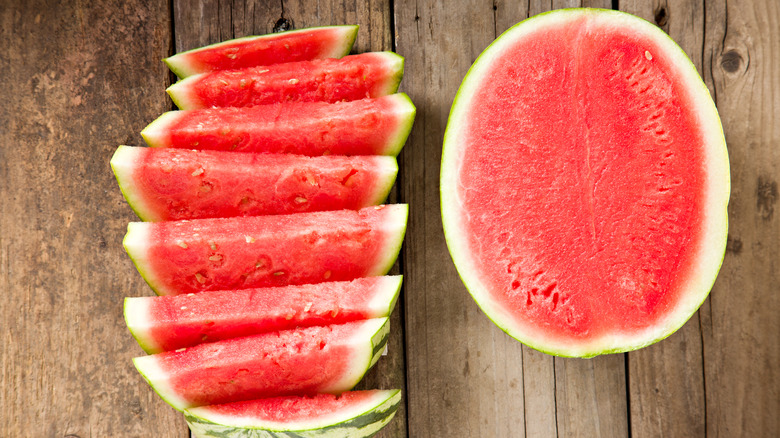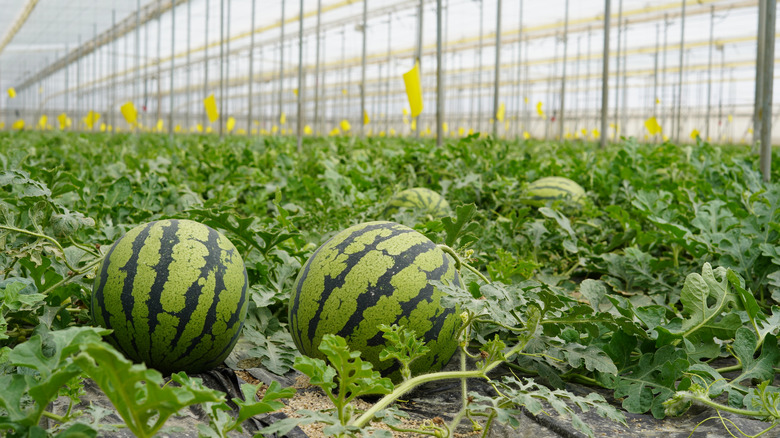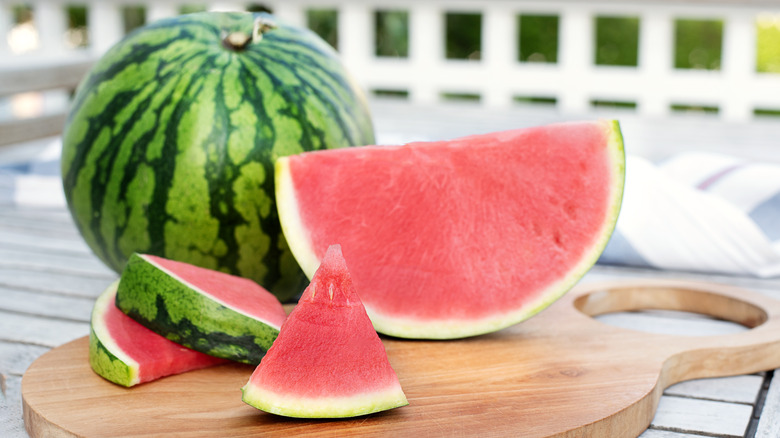Does Seedless Watermelon Actually Taste Sweeter Than Other Varieties?
A downside to enjoying some fruits is their annoying seeds. They can taste unpleasant, be difficult to remove, and leave less space for the good stuff — the actual fruit. Watermelon seeds can be particularly bothersome. Unless you buy a seedless watermelon, you'll end up spitting out plenty of hard, black seeds, or picking them out by hand.
Though they may not be effortless to eat, seeded watermelons aren't necessarily inferior. University Hospitals touts the health benefits of the seeds, which contain high levels of magnesium, zinc, iron, and healthy fats. They can be roasted and eaten, or even turned into a tahini-esque butter. Some also say that conventional, seeded watermelons have sweeter flesh than the seedless kind. Do some research, though and you'll also find people saying the exact opposite: that seedless watermelons are the sweeter variety.
We're here to debunk both of these myths: Neither seeded nor seedless watermelons are inherently sweeter than their counterparts. Genes, growing conditions, and growth management play more of a role in determining sweetness. A watermelon's aroma, color, and texture, as well as its sugar content, are determined by the interactions between these three variables. It is true that some melon varieties are sweeter than others — one of the most popular and oldest watermelon breeds, the Crimson Sweet, has a high sugar content of around 12%. However, Crimson Sweet seeds can produce either seeded or seedless watermelons, with a similar sugar content, so long as the plants are grown in similar ways.
The science behind seedless and sweeter watermelons
The first seedless watermelons were bred in Japan in 1942 by Dr. H. Hikara and a group of researchers. The new-and-improved seedless melons debuted on the market in 1950 to great success. These types of melons are not genetically modified organisms. Instead, they are created by cross-pollinating plants to produce fruit that has three sets of chromosomes, versus the regular two sets. The odd number of chromosomes results in a fruit that cannot produce those large black seeds found in conventional watermelons.
Though scientists haven't found evidence that the extra set of chromosomes influences the sweetness of the melon, they have found a genetic mutation in modern watermelons that makes them sweeter. A 2020 study published in New Phytologist revealed that a special mutation on a sugar-transporter gene, known as CIVST1, has been found in some cultivated watermelons. This gene is responsible for moving sugar from the plant's nutrient transport system to the fruit itself, resulting in a sweeter flavor.
The special mutation makes the CIVST1 gene more effective at its job, giving you that super-sweet flavor. Farmers have selected and replanted watermelons that express CIVST1 over many years, making it endemic to the modern watermelons you can buy at a grocery store, seedless or not. On the other hand, wild watermelons lack this mutation, which is why they may taste bland and bitter. All in all, flavor changes don't depend on the presence of seeds.
How to pick the best watermelon
Since seeds or a lack thereof don't guarantee that you'll get a sweeter watermelon, how can you find a good one? There are a couple of clever tricks you can use to pick a perfectly ripe and extra sugary watermelon. Just look for key features in the watermelon's size and shape, weight, and color.
Firstly, look for a watermelon that is uniformly-sized and -shaped, whether it's a round variety or an oval one. A lack of bumps or other deformities is linked to tastier, sweeter fruit. Next, pick up the melon to gauge its weight. The heavier, the better, as heavier watermelons tend to have more juice and sweetness. The color of the rind is also important. Look for a dull, dark green rind, as this indicates that the melon is riper and sweeter. Skip any shiny, light green melons, as they are likely to be less mature.
Notably, if you pick up a seedless watermelon, but notice soft white "seeds" upon cutting it open, it doesn't mean you've bought a dud. Instead of mature, black seeds, seedless watermelons may produce white "seed coats." These aren't capable of germinating and sprouting, because they're merely the outer husk of would-be mature seeds that never fully developed. And according to the National Watermelon Promotion Board, seedless watermelons have much the same nutritional value as seeded varieties — though the color of your watermelon could make for a nutritional difference.



